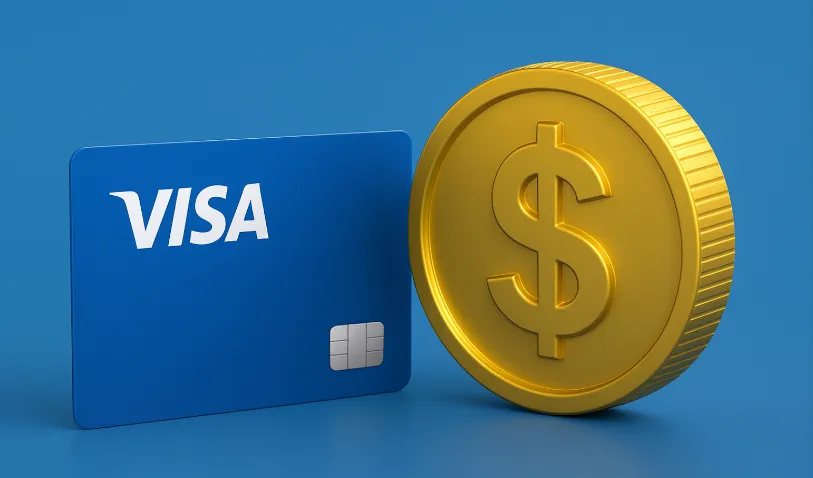Recent market activity shows that the prices of privacy-focused cryptocurrencies have surged significantly. While Bitcoin and Ethereum dominate the headlines with their transparent ledgers, an increasingly prominent sector in the market is prioritizing anonymity. This has brought privacy coins, once a niche area, into the spotlight, attracting both capital and regulatory attention. Understanding this trend is crucial for anyone involved in the digital asset space.
This article will delve into the world of privacy coins. We will cover why financial privacy is a vital concept, explore the reasons behind the recent influx of funds into these tokens, and analyze the technologies that enable their anonymity. We will also introduce leading privacy coin projects, analyze market trends, and discuss the significant risks and regulatory challenges they face.
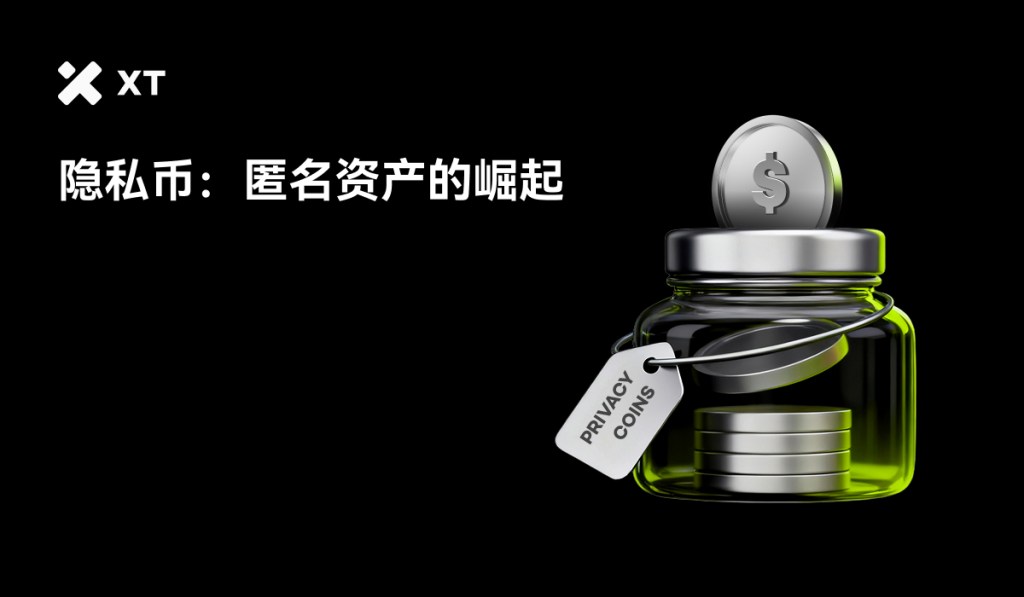
Why Privacy Coins Are Essential
In the digital age, financial privacy is becoming increasingly scarce. Most traditional financial systems and blockchain financial systems are designed to be transparent. Your bank knows every transaction you make. Public chains like Bitcoin and Ethereum, while pseudonymous, have public ledgers that make every transaction traceable. Through advanced analytical techniques, it is often possible to link wallet addresses to real-world identities.
This level of transparency raises several issues. For individuals, it exposes personal spending habits, wealth, and financial relationships, making them targets for advertising, surveillance, or even crime. Imagine if your salary, rent payments, and every purchase became publicly accessible information. This would erode personal security and autonomy.
For businesses, the lack of financial privacy represents a competitive disadvantage. Companies need to protect sensitive financial data, such as payroll, vendor payments, and investment strategies. A transparent ledger exposes this information to competitors, undermining their strategic operations. Privacy coins provide a solution by enabling confidential transactions, a fundamental requirement for business activities.
Ultimately, privacy is not about hiding illegal activities; it is a fundamental right. It ensures financial freedom, prevents undue surveillance, and facilitates secure business transactions. In an increasingly digital economy, privacy-focused cryptocurrencies provide the necessary tools to uphold this right.
Why Is There Recent Influx of Funds into Privacy Tokens?
Several factors have contributed to the recent surge in interest and capital for privacy tokens. This trend is not driven by a single catalyst but is a composite result of market sentiment, technological advancements, and changes in the global landscape.
First, awareness of digital surveillance is growing. As people become more aware of how companies and governments collect and use their data, the demand for enhanced privacy technologies has increased. This demand extends to the financial sector, with many investors seeking alternatives to transparent financial systems. Privacy coins directly meet this need by providing a way to transact without leaving a public financial footprint.
Second, the geopolitical climate plays a significant role. During times of turmoil, sanctions, or capital controls, individuals and entities look for ways to transfer and protect assets outside traditional systems. Privacy coins offer a censorship-resistant and confidential means of value transfer, making them attractive in regions facing economic or political instability.
Finally, the cryptocurrency market itself is maturing. Investors are looking beyond Bitcoin to diversify their portfolios. As they explore different areas within the crypto ecosystem, the unique value proposition of privacy coins becomes more apparent. Speculative interest also plays a role, as traders anticipate that ongoing demand for privacy will continue to drive prices higher. This creates a self-reinforcing cycle where rising prices attract more attention and investment.
Getting Started: How Cryptocurrencies Achieve Privacy
Privacy coins are built in various ways. They employ different cryptographic techniques to hide transaction details, including sender addresses, recipient addresses, and transfer amounts. Let’s explore some of the core technologies that achieve this privacy.
Stealth Addresses
Stealth addresses are a key feature used by coins like Monero (XMR). This mechanism allows the sender to create a unique one-time public address for the recipient for each transaction. Only the sender and recipient can determine where the funds are going. To external observers, each transaction appears to flow to a new, unique address, making it impossible to link different payments to the same recipient.
Ring Signatures
Ring signatures are another core technology of Monero, used to hide the identity of the sender. When you send a transaction, your digital signature is mixed with a group of other signatures from past transactions on the network. This group is called a "ring." Observers can verify that a participant in the ring authorized the transaction, but they cannot determine exactly who it was. It’s like having one person in a group sign a document, but their signature is cryptographically mixed with others, keeping the true signer anonymous.
zk-SNARKs (Zero-Knowledge Succinct Non-Interactive Arguments of Knowledge)
This complex form of cryptography is known for its use in Zcash (ZEC). zk-SNARKs allow one party (the prover) to prove to another party (the verifier) that a statement is true without revealing any information other than the validity of the statement.
In the context of Zcash, this means a transaction can be verified as valid by the network without disclosing the sender, recipient, or amount. The blockchain confirms that the sender has the funds and has not double-spent, while all transaction details remain completely encrypted. This provides what is known as "shielded" or fully private transactions.
CoinJoin
CoinJoin is a mixing technique used by privacy-optional coins like Dash (DASH). It combines multiple transactions from different users into a larger transaction. When this combined transaction is recorded on the blockchain, it becomes difficult for external observers to determine the exact inputs and outputs. For example, if three people each send one DASH to three different recipients, CoinJoin can merge them into a single transaction with three inputs and three outputs, effectively obfuscating them and severing the clear trail between sender and recipient.
Overview of Coins and Market Snapshot
The privacy coin space is diverse, with several major players offering different approaches to anonymity. Here are some of the most notable projects.
Monero (XMR)
Monero is often regarded as the gold standard of privacy coins. Launched in 2014, its sole focus is to make privacy a mandatory default option for all users. It achieves this through a powerful combination of stealth addresses, ring signatures, and a technology called RingCT (Ring Confidential Transactions), which hides transaction amounts. Because privacy is not optional, the entire Monero network benefits from a large and consistent anonymity set, making it extremely difficult to trace transactions. This unwavering commitment to privacy has made it a favorite among privacy advocates and a target for regulators.
- Privacy Model: Monero uses ring signatures, stealth addresses, and RingCT technology to default hide the sender, recipient, and transaction amount—every transaction is private unless the user actively discloses details.
- Commentary and Adoption: Monero remains a typical fully private coin, with an active developer community that regularly upgrades the protocol to optimize performance and privacy. Because transactions are private by default, on-chain analysis is limited, and exchanges may face regulatory pressure due to Monero's listing; nevertheless, Monero maintains on-chain usage among privacy-focused users.
- Risks: Faces the risk of regulatory delisting and may be subject to higher scrutiny from exchanges or banks; additionally, the default privacy feature complicates certain institutional uses (compliance teams prefer traceability).
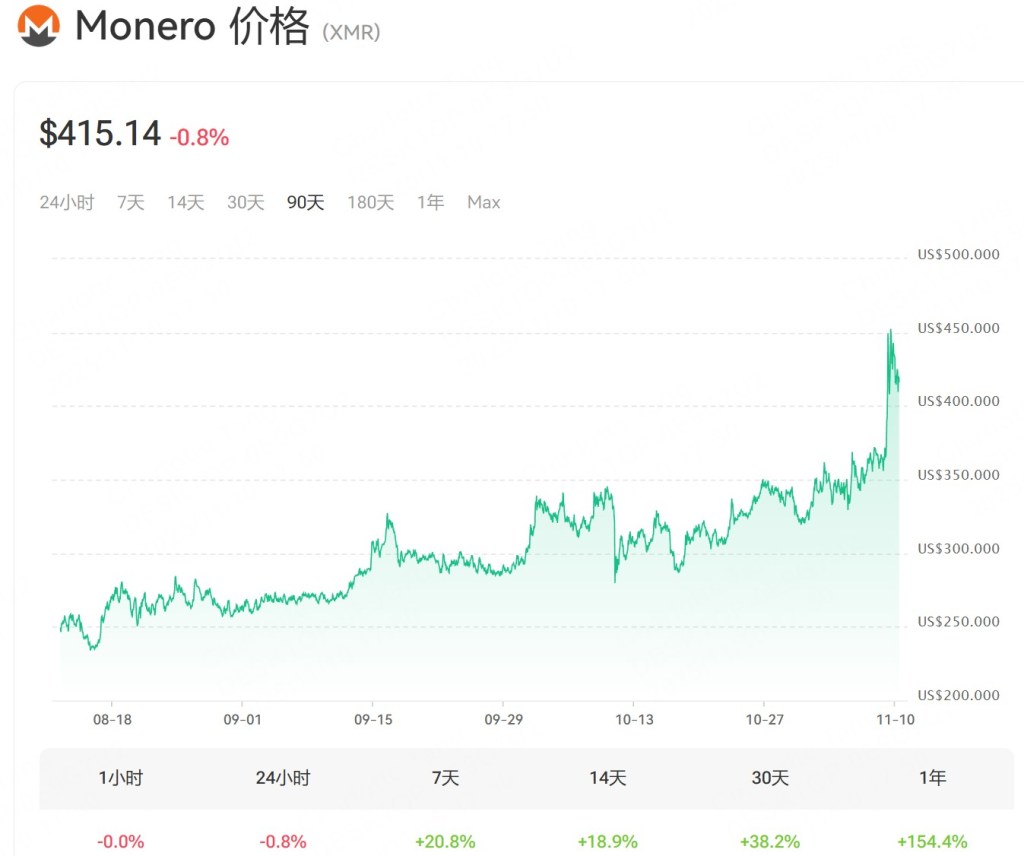
Learn more about Monero (XMR) price.
Zcash (ZEC)
Zcash was launched in 2016, offering another model: optional privacy. It has two types of addresses: transparent addresses (t-addresses), which work similarly to Bitcoin; and shielded addresses (z-addresses), which use zk-SNARKs to achieve complete privacy. Users can choose to send transactions between transparent addresses, shielded addresses (fully private), or between both types. This flexibility allows Zcash to adapt better to different regulatory environments, but it also means its anonymity set is smaller than Monero's, as not all transactions are private.
- Privacy Model: zk-SNARKs technology supports shielded transactions, capable of hiding transaction amounts and addresses. Zcash's shielded pool has improved over time (from Sapling to Orchard), reducing costs and enhancing user experience, but the use of shielded transactions remains optional.
- Commentary and Adoption: ZEC's optional privacy means its effective anonymity set is smaller than Monero's; however, Zcash's research advancements in zk technology have impacted the broader ecosystem (e.g., specific implementations of zk technology). Recent infrastructure updates and a resurgence of market interest have driven price increases.
- Risks: Optionality reduces the effective anonymity set unless the use of shielded transactions increases; like other privacy coins, it faces regulatory scrutiny; protocol and governance choices (founder rewards, developer funding) affect community sentiment.
Learn more about Zcash (ZEC) price.
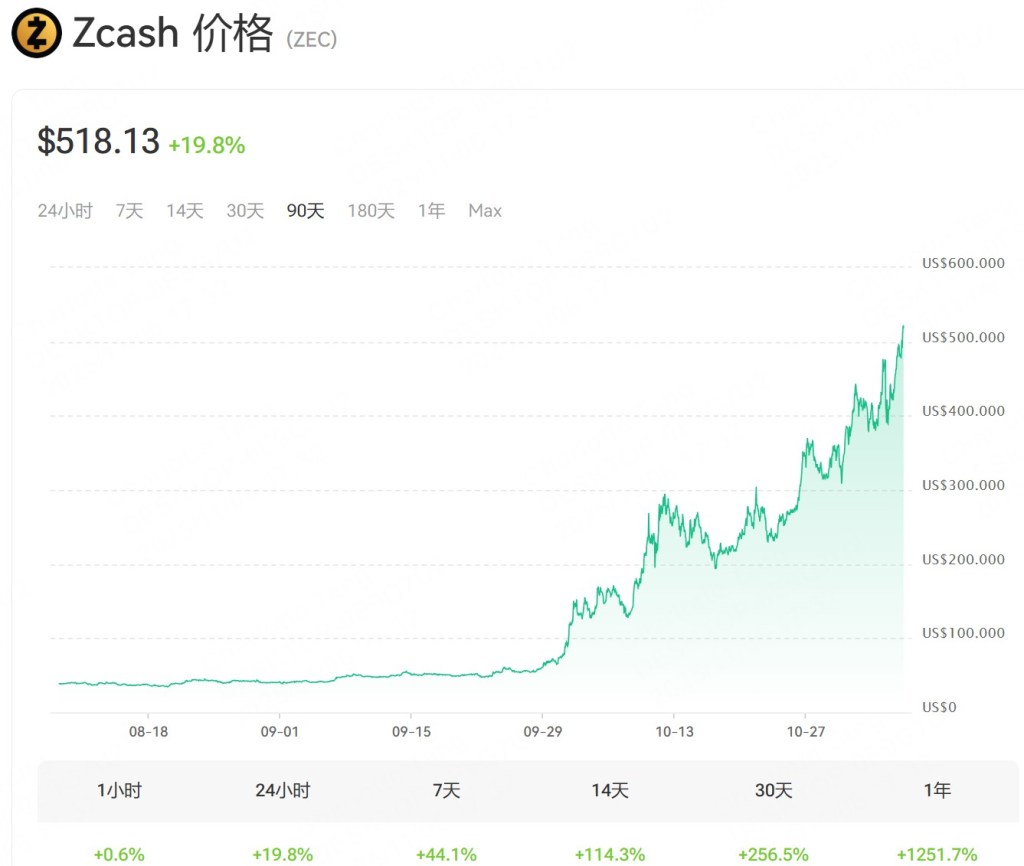
Dash (DASH)
Dash was initially launched in 2014 under the name XCoin, focusing on speed and ease of use, with privacy as an optional feature. Its privacy mechanism, called PrivateSend, is based on CoinJoin technology. Users can choose to mix their tokens with those of other users to obfuscate transaction history. While its privacy is not as robust as that offered by Monero or Zcash, PrivateSend provides a good level of privacy protection for users who need it, while the network remains fast and low-cost for standard transparent transactions.
- Privacy Model: Dash offers PrivateSend (CoinJoin-style mixing conducted through masternodes) as an optional privacy feature; additionally, it provides InstantSend and a masternode governance/funding system, distinguishing it from other coins here.
- Commentary and Adoption: Dash positions itself as a payment coin and offers optional privacy features. Because privacy is optional, Dash faces slightly less regulatory and exchange pressure in certain regions compared to Monero—however, Dash has had historical controversies regarding privacy, and public perception is mixed. The recent price surge indicates a renewed interest in earlier privacy/payment projects in the market.
- Risks: The optional privacy reduces the guarantee of anonymity; the centralization of masternodes and past reputation issues are concerns for investors.
Learn more about Dash (DASH) price.
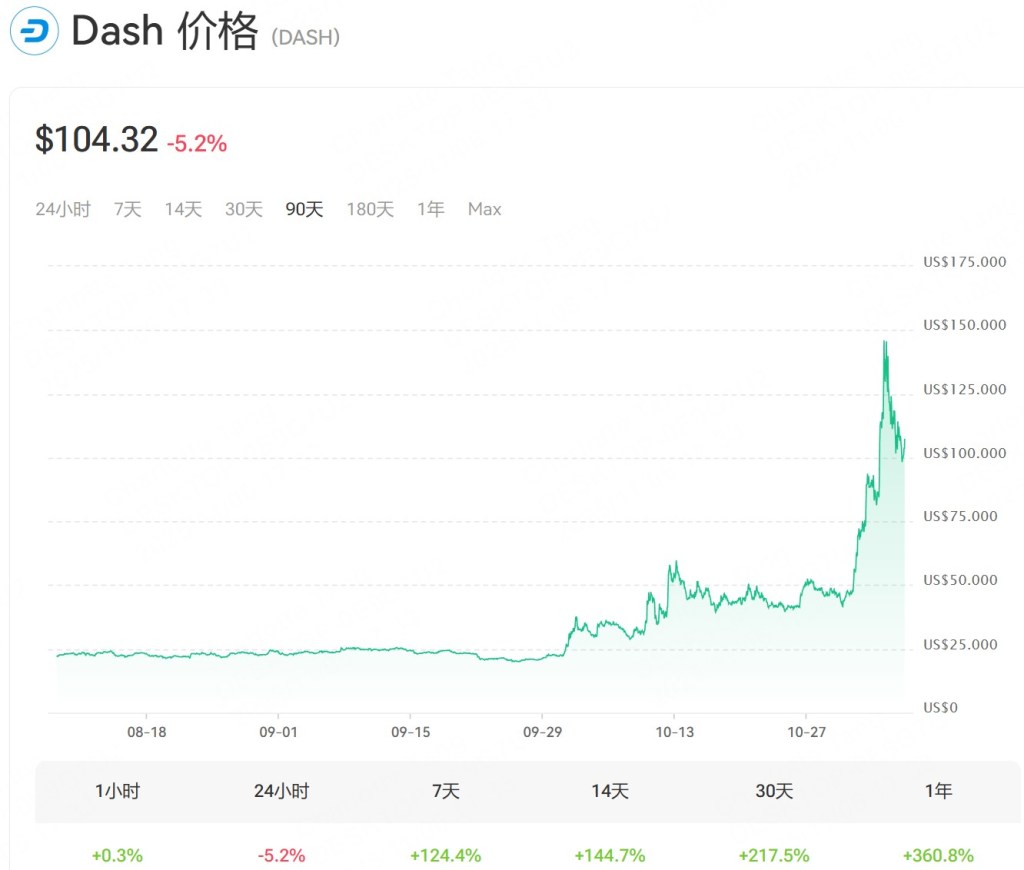
Decred (DCR)
Decred is a blockchain that combines proof-of-work and proof-of-stake, focusing on governance and adaptability. In 2019, it integrated an optional privacy feature based on an improved CoinJoin protocol. This allows DCR holders to stake in a way that mixes their transaction history, thereby anonymizing the source of their funds. Decred's approach integrates privacy into its governance and staking system, providing a unique value proposition for users who value both security and anonymity.
- Privacy Model: At its core, Decred emphasizes governance—mixing PoW/PoS and on-chain voting—while privacy features like CoinShuffle++ are explored/implemented as optional tools rather than default behavior.
- Commentary and Adoption: The narrative of DCR focuses more on resilience and community-driven governance rather than privacy-first usage. Nevertheless, optional privacy tools exist and may be further expanded through governance voting. Recent market trends indicate that investors are increasingly turning to small-cap projects with narratives that extend beyond pure privacy value.
- Risks: The optionality of privacy means adoption is not guaranteed; governance decisions have a substantial impact on the roadmap and investor expectations.
Learn more about Decred (DCR) price.
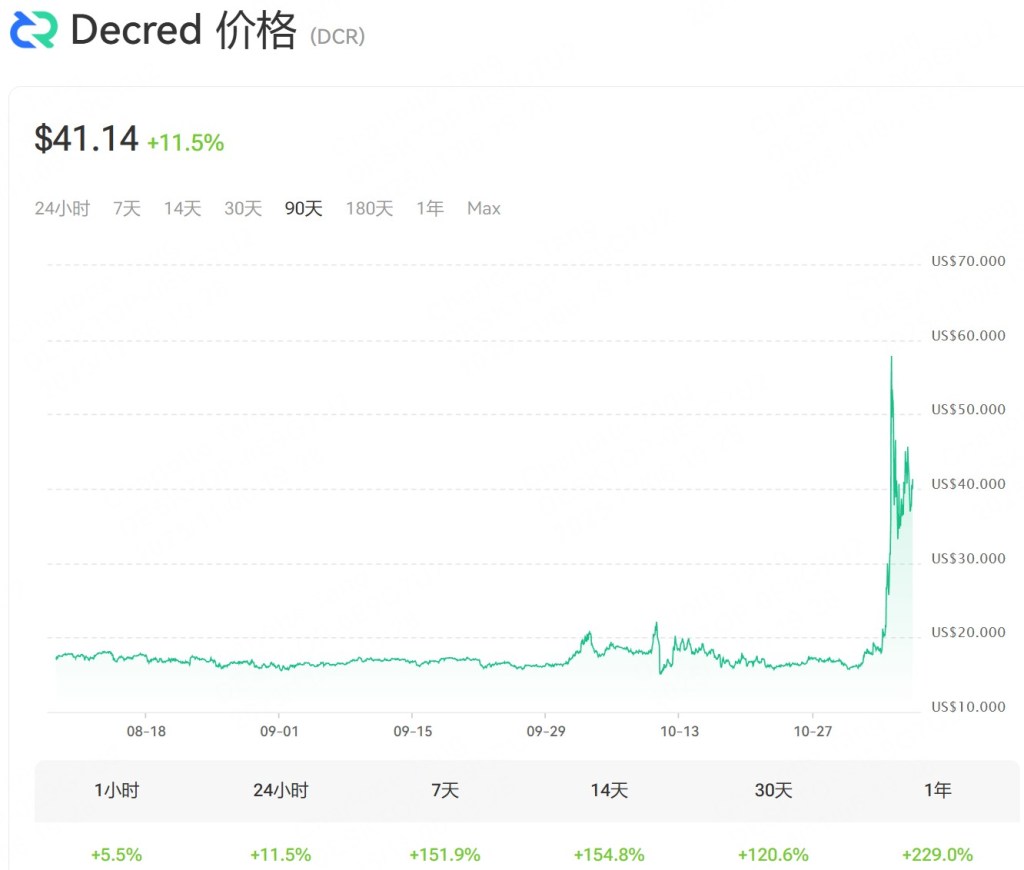
Horizen (ZEN)
Horizen is a blockchain platform focused on providing developers with tools to build private applications and sidechains. Its main chain employs zk-SNARKs technology similar to Zcash, offering optional privacy. However, Horizen's broader vision is to create an interoperable blockchain ecosystem where businesses and developers can launch their own chains with customized privacy features. This positions Horizen more as a decentralized application platform focused on privacy rather than merely a currency.
- Privacy Model: Horizen has historically emphasized sidechains and modular privacy tools. Its architecture supports privacy-oriented components that can be deployed in sidechains or at the application layer.
- Commentary and Adoption: Horizen's technical roadmap combines privacy-oriented technology with sidechain functionality; this is attractive to projects that desire optional privacy and a more flexible architecture. Recent market performance shows that its price has experienced strong growth alongside similar small to mid-cap altcoins over the past 30 days.
- Risks: Adoption rates depend on the projects built on the platform; privacy may not necessarily be the primary narrative for all ZEN use cases.
Learn more about Horizen (ZEN) price.
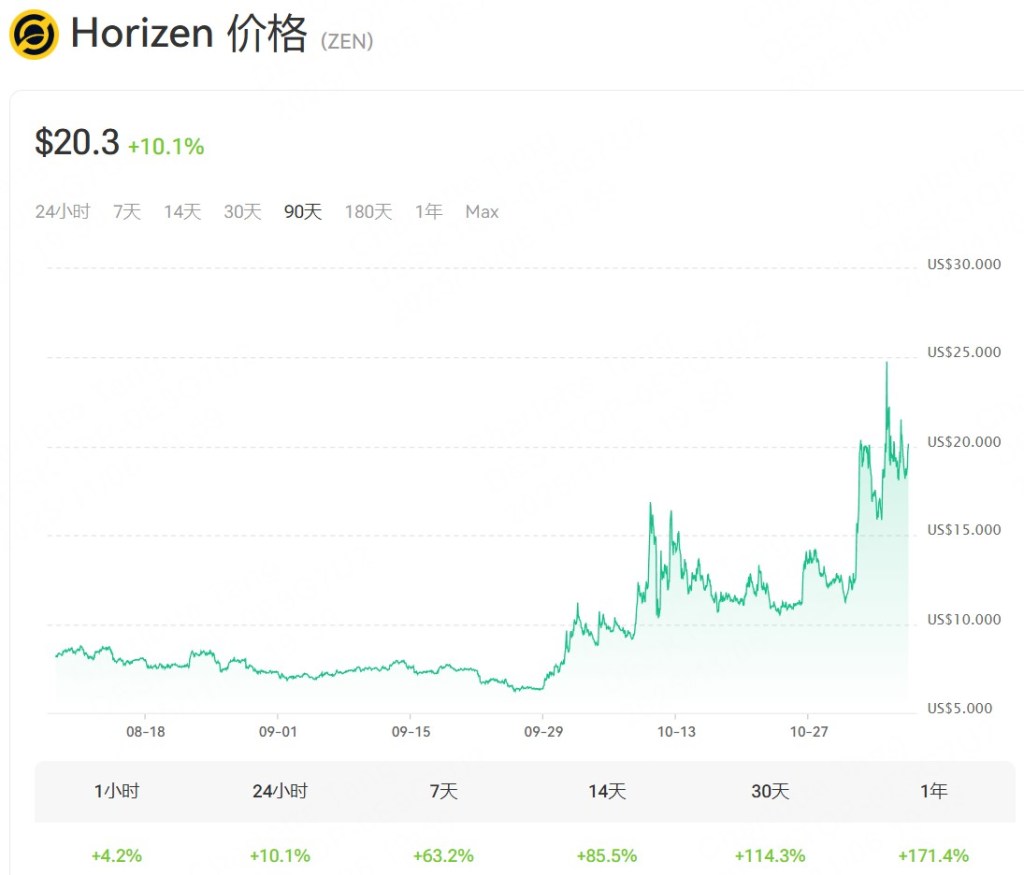
Market Analysis and Trends
The privacy coin market is showing clear signs of recovery. After a period of volatility in sync with the broader market, these tokens are beginning to stand out. A major trend is the "privacy premium," where investors are willing to pay higher prices for assets that provide strong anonymity guarantees. This is reflected in the strong performance of XMR and ZEC relative to other altcoins during the recent market uptrend.
Another important trend is the differentiation between "default privacy" and "optional privacy" models. Coins like Monero, which enforce privacy, are gaining favor among purists. However, coins like Zcash and Dash, which offer optional privacy, may be better suited to navigate complex regulatory environments, as they can provide transparency when needed. This duality is creating two distinct sub-sectors within the privacy coin market.
Institutional interest, while still in its infancy, is beginning to emerge. Some investment funds and high-net-worth individuals are quietly accumulating privacy coins to hedge against financial surveillance and the risk of being "de-platformed" by traditional financial systems. As blockchain analysis tools become increasingly powerful, the value of true transaction privacy may rise, potentially driving further institutional adoption.
Risks and Regulatory Landscape
Despite the growing popularity of privacy coins, they face significant headwinds, primarily from regulators. Governments and financial regulatory bodies around the world are concerned that the anonymity they provide could be used for money laundering, terrorist financing, and other illegal activities.
This has triggered a wave of regulatory actions. Many mainstream cryptocurrency exchanges have delisted privacy coins like Monero, Zcash, and Dash under regulatory pressure. This has occurred in jurisdictions such as South Korea, Japan, and Australia, making it more difficult for users in these areas to buy and sell these assets. This reduces liquidity and may suppress prices.
The threat of regulation remains ongoing. The Financial Action Task Force (FATF), an intergovernmental body that sets anti-money laundering standards, has issued guidance requiring virtual asset service providers (such as exchanges) to collect and share information about the originators and beneficiaries of transactions. This is known as the "travel rule," which is fundamentally incompatible with the design of many privacy coins.
In addition to delisting, there is also the risk of outright bans. Some countries may decide to classify the possession or use of privacy-enhanced cryptocurrencies as illegal. This poses significant legal and financial risks for holders of these assets. Investors must carefully weigh the powerful utility of privacy coins against the real regulatory threats that could impact their value and accessibility.
Trading Privacy Coins on XT Exchange
Explore the potential of privacy coins on the XT.COM exchange. Whether you prefer the flexibility of spot trading or the leverage of futures trading, XT.COM provides a platform for trading leading privacy coins.
Spot Trading
Trade privacy coins directly and experience real-time market fluctuations.
Futures Trading
Leverage your trading strategies and hedge against market volatility.
Visit XT.COM now to start your journey in trading privacy coins.
Conclusion
The recent surge in privacy cryptocurrencies highlights the escalating tension in our digital world: the conflict between transparency and fundamental privacy rights. These assets provide powerful tools for financial anonymity, addressing the clear need for individuals and businesses to protect their financial data. Technologies like ring signatures and zk-SNARKs are no longer theoretical concepts but engines of a burgeoning market worth billions of dollars.
However, the road ahead is fraught with challenges. The same characteristics that empower users have attracted the attention of regulators, leading to delistings and legal uncertainties. The future of the industry may hinge on a delicate balance—between innovation in privacy technology and the ability to adapt to regulatory requirements.
For investors and enthusiasts, understanding the prospects and risks is crucial. The demand for financial privacy is unlikely to disappear. As our world becomes more interconnected and surveilled, the value proposition of these coins may only strengthen. The question is whether they can mature into a stable and accepted part of the broader financial ecosystem or be forced further to the margins.
About XT.COM
Founded in 2018, XT.COM is a leading global digital asset trading platform, now boasting over 12 million registered users, with operations in over 200 countries and regions, and an ecosystem traffic exceeding 40 million. The XT.COM cryptocurrency trading platform supports over 1300 quality coins and 1300+ trading pairs, offering diverse trading services such as spot trading, margin trading, and futures trading, along with a secure and reliable RWA (Real World Assets) trading market. We adhere to the philosophy of "Exploring Crypto, Trusting Trading," committed to providing global users with a safe, efficient, and professional one-stop digital asset trading experience.
免责声明:本文章仅代表作者个人观点,不代表本平台的立场和观点。本文章仅供信息分享,不构成对任何人的任何投资建议。用户与作者之间的任何争议,与本平台无关。如网页中刊载的文章或图片涉及侵权,请提供相关的权利证明和身份证明发送邮件到support@aicoin.com,本平台相关工作人员将会进行核查。



